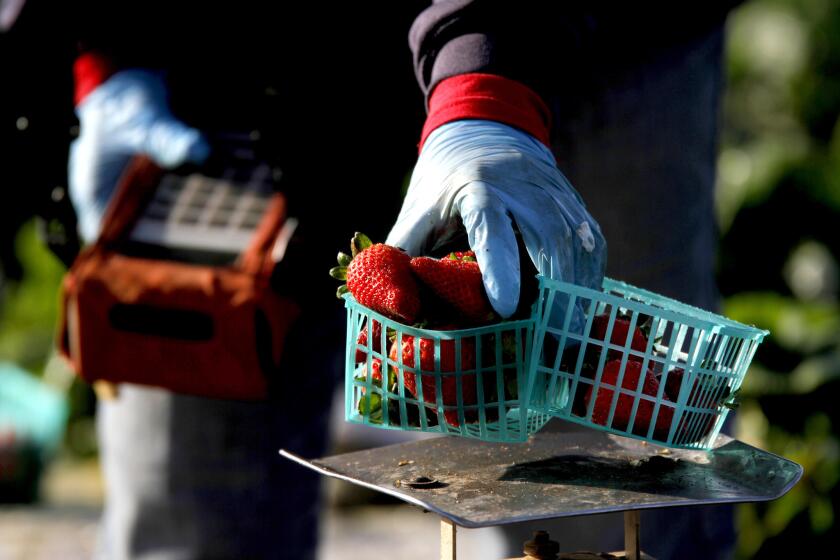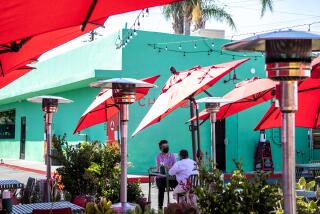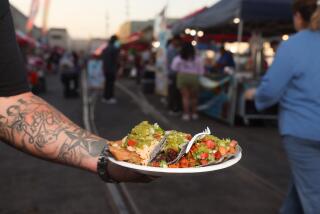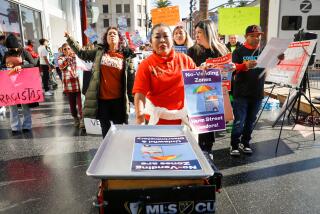Can tacos stand against coronavirus? L.A. street vendors struggle under lockdown
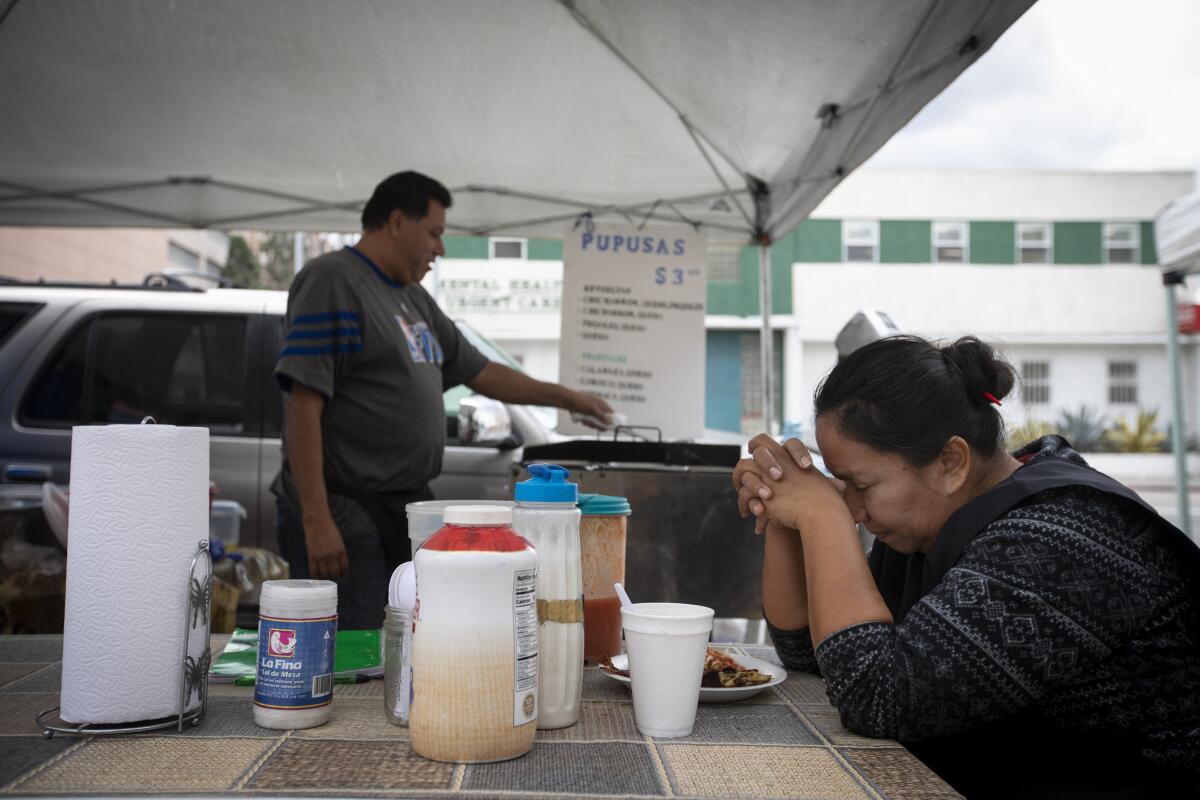
Outside Los Angeles County-USC Medical Center, street vendors called out to passersby, trying to entice them with gorditas, tamales or pupusas.
Many of them have sold there for years, side by side with food trucks, used to a steady flow of hospital patients and staff day and night.
But after the coronavirus outbreak started, the L.A. County Department of Health Services began rescheduling all nonurgent appointments and postponing elective surgeries and procedures.
Food vendors who made hundreds of dollars a week are now making only enough to cover their expenses.
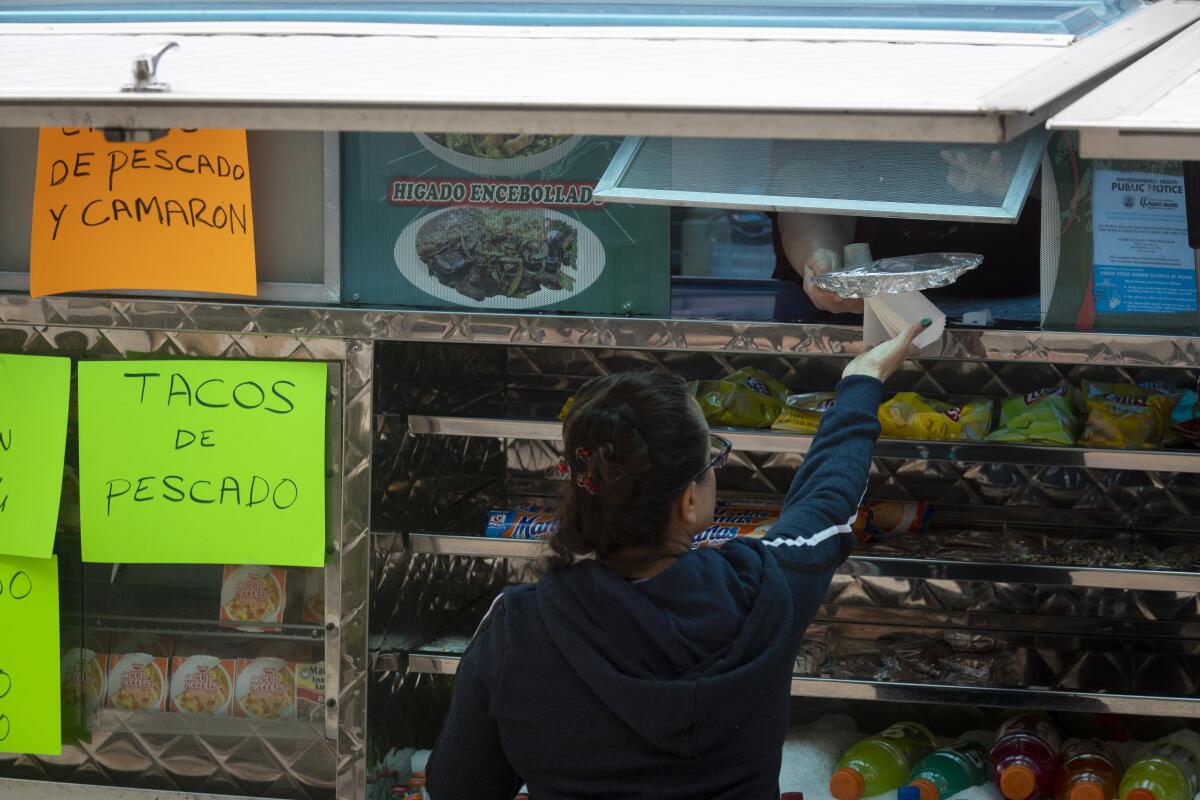
Under a white tarp, three women sat nearly shoulder to shoulder Tuesday as Patricia Escobar prepared pupusas. They pulled down flimsy purple masks to speak.
“We need to trust in God,” Escobar told them, as she slapped the masa between her gloved hands. She and her husband, both Salvadoran, have sold pupusas there for a year and a half, choosing that spot because of the constant traffic.
Now though, the streets were empty. “It’s the panic,” said customer Laura Bolanos, who had come to the hospital that morning with her teenage daughter for an appointment.
It isn’t so much the virus that worries Bolanos; it’s the financial fallout. That week, her husband’s boss at a Huntington Park car service told him they might have to shut down for two weeks.
“The poorest,” she pronounced, “are always the most screwed.”
Sidewalk sellers are already facing the strain of dwindling crowds and meager sales as Angelenos hunker down at home to avoid spreading the novel coronavirus. Now the city could also ramp up its enforcement on vendors.
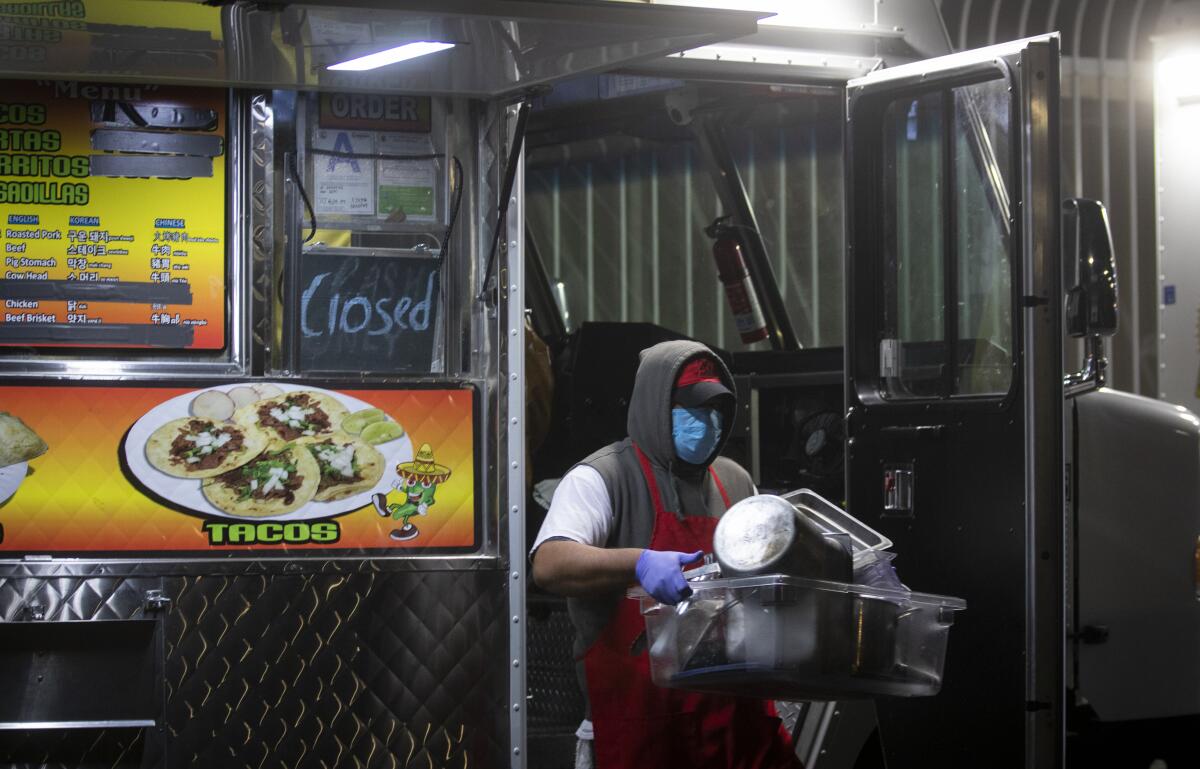
The L.A. City Council voted unanimously Tuesday to crack down on food vendors who lack health permits, a move that Councilwoman Monica Rodriguez argued was needed to protect Angelenos amid the pandemic. Rodriguez, who had initially proposed a blanket moratorium on vending, said she was worried about crowds gathering at vending sites.
“If we can close restaurants, if we can close hotels, if we can close movie theaters because people gather there ... then we can also put a pause on street vending,” Councilman Gil Cedillo said, calling it a “critical moment.”
California’s nearly $50-billion agricultural industry is bracing for a potential labor shortfall that could hinder efforts to maintain the nation’s fresh food supply amid the widening coronavirus outbreak.
Until now, L.A. had been enforcing some basic rules about where and how people can sell food or goods but not citing vendors for lacking city permits. The grace period, expected to last through the end of June, was supposed to give vendors time to learn about the rules and get permits under the new system set up by the city.
The new push from the City Council would effectively terminate that grace period for food vendors, according to city officials. Few have gotten their permits: As of this week, only 29 food vendors had obtained permits from the city, whose requirements include having a health permit from the county, according to the Department of Public Works.
“It’s effectively a moratorium on vending because it has been so difficult for vendors to access the county health permit,” said Doug Smith, supervising staff attorney at the pro bono law firm Public Counsel.
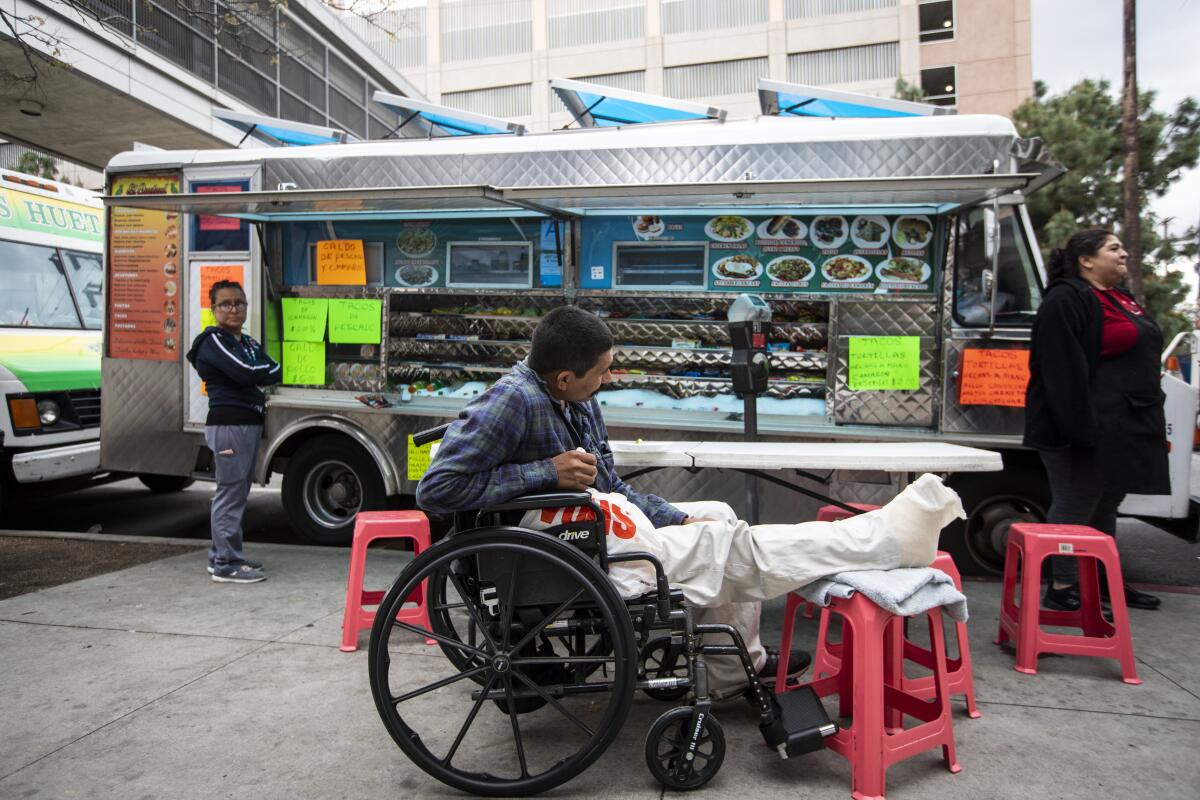
Porter Ranch resident David Lasher said the move was long overdue, citing concerns that vendors in the San Fernando Valley were using unsanitary practices and leaving propane tanks sitting out on the sidewalk.
“A brick-and-mortar restaurant 50 feet away is subject to a thousand regulations these guys are skirting,” said Lasher, who is a board member with the Porter Ranch Neighborhood Council but was not speaking on its behalf. “I don’t know why they gave them a grace period.”
In a recent letter to council members, the Los Angeles Street Vendor Campaign complained that obtaining the health permit was extremely difficult and costly, with a $772 fee for an annual permit.
To get the county permit, vendors “must navigate an incredibly opaque system and make multiple trips to Baldwin Park — far from most vendors’ place of work and a difficult location for those without vehicles,” the coalition wrote.
The latest updates from our reporters in California and around the world
In addition, the group complained that there is no existing cart available on the market that meets city, county and state requirements for selling hot food. That has affected which vendors have applied for permits. Public works spokeswoman Elena Stern said that so far, most of the food vendors who have gotten city permits are selling ice cream or pre-packaged food.
Smith said he was puzzled that the city was pledging to crack down on vendors who lacked the county permit — a county requirement that the county enforces. Rodriguez aides said the idea was for the city to enforce its own permit rules on food vendors, who must have the county permit before they can get the city permit.
The push for a crackdown worried vendors and their advocates, who said many of these workers cannot apply for unemployment benefits or other benefits from the federal government because they are in the U.S. illegally.
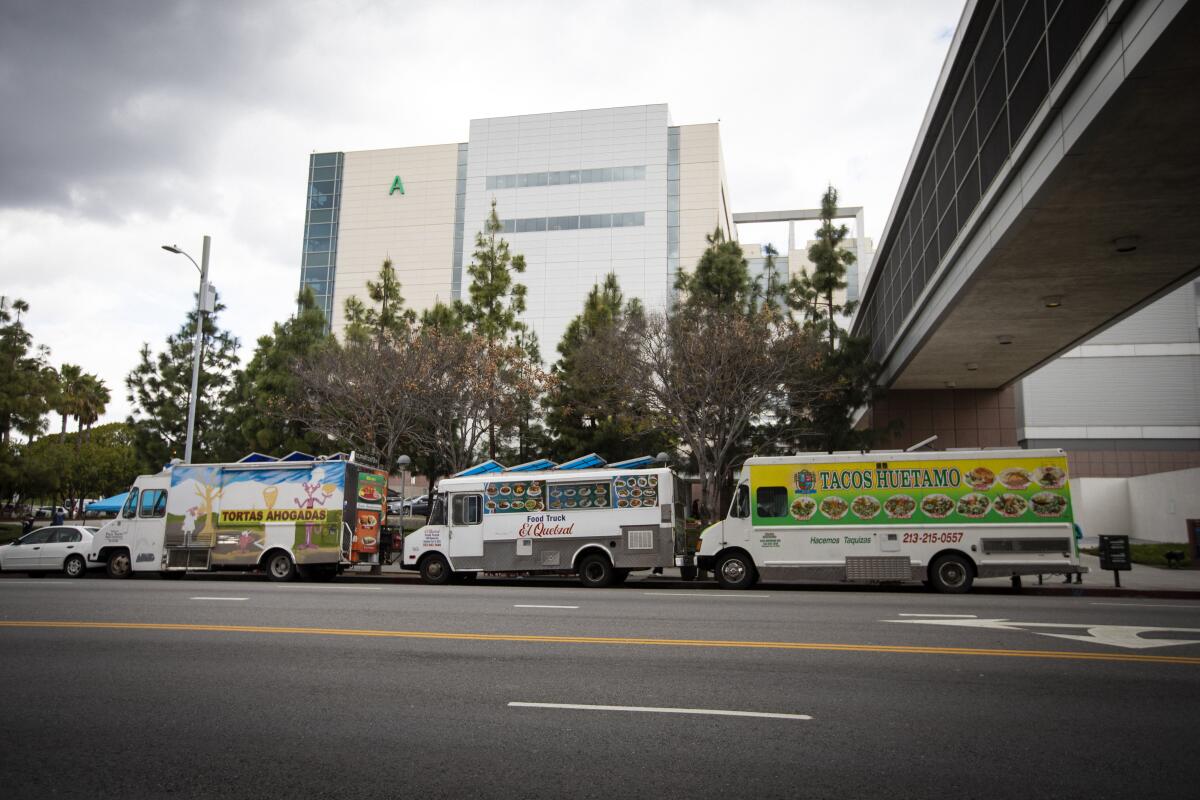
“I don’t want to suggest that vendors expect to operate business as usual — we’re all needing to take difficult steps,” Smith said. “But how do we also support them and create opportunities so that folks who are already the most vulnerable don’t slip through the cracks?”
Smith pointed to Washington, D.C., where vendors are to become ad hoc public health ambassadors to curb the spread of the coronavirus. In exchange for distributing hand sanitizer and health information, vendors would earn a stipend to help with lost wages, according to the Washington Post.
Vendor advocates have suggested grants or loans to help vendors — who don’t have paid sick leave — weather the crisis. The City Council did vote Tuesday, at the urging of Councilman Jose Huizar, to look into refunding the permit fees already paid by sidewalk vendors.
“There’s a big concern on our end of folks not having the cash, not having the resources they need,” said Carla De Paz, director of organizing for the East L.A. Community Corp., which is part of the Los Angeles Street Vendor Campaign. “We don’t want to push people into deeper economic crisis.”
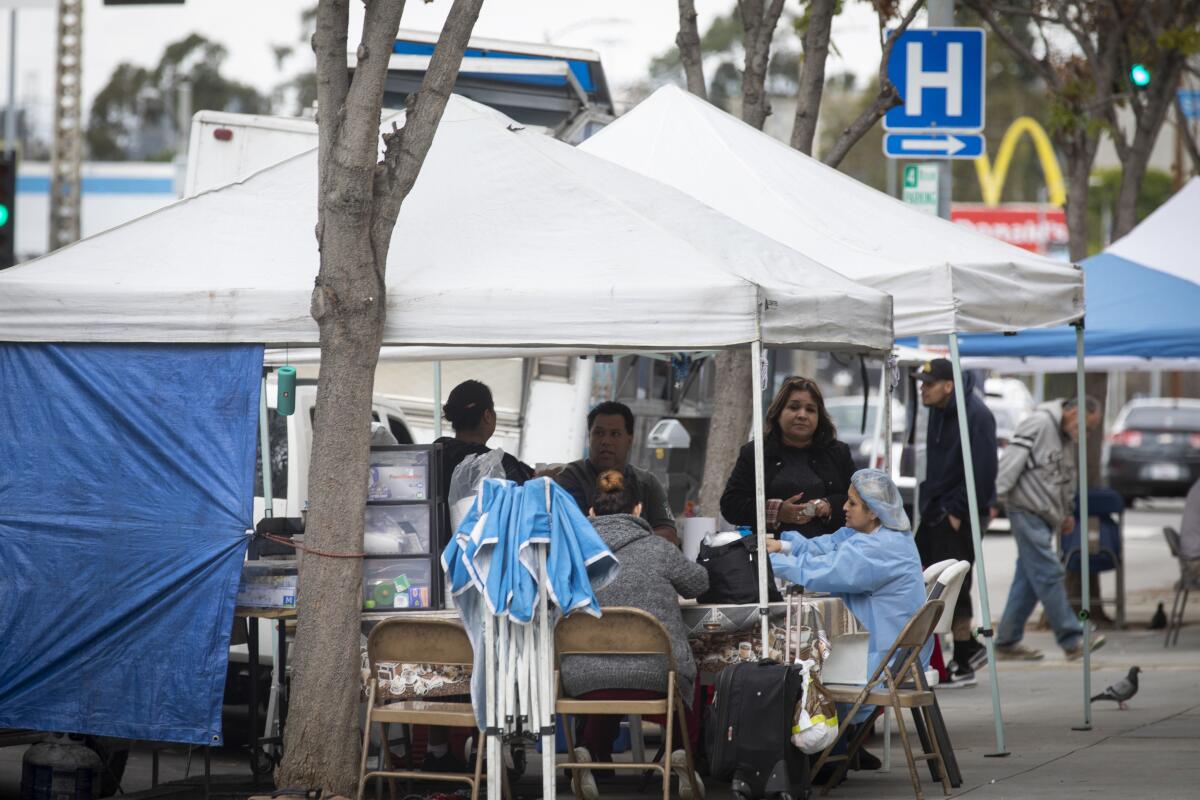
Along a Lincoln Heights side street, taqueros wearing blue gloves filled tortillas with carne asada, pastor or suadero on Tuesday night as they worked over an open-air grill.
For the most part, it looked like any other night at the Avenue 26 taco stand, which has set up along this street for over a decade. But the customers waiting for dollar tacos kept a distance in line. Some have started using plastic before gripping tongs at the toppings bar.
And there’s no denying there are fewer people showing up. Over the last week, there’s been a nearly 50% drop in sales, its manager said. The owners have talked to employees about potentially cutting hours, or pay.
“Business has gone down,” said Cesar Martinez, the manager. “We thought it was the rain. But, yeah, a lot of people are talking about the pandemic ... it’s affecting everyone.”
Throughout Tuesday night, customers lined up at the taco spot for the last night that workers would be cooking outside. They planned to shift operations to two taco trucks, for the safety of the customers and workers.
Although there were fewer people showing up, some of the regulars made sure to come by.
“We’re not letting this slow us down,” said David Nordberg, as he held a bag of 16 tacos. “Our friends still have to make a living, and I love the food.”
More to Read
Sign up for Essential California
The most important California stories and recommendations in your inbox every morning.
You may occasionally receive promotional content from the Los Angeles Times.
